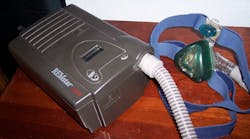A recent study conducted by the University of Minnesota/Morris with truck drivers suffering from obstructive sleep apnea (OSA) found that if drivers failed to stick with the positive airway pressure (PAP) treatment prescribed for their condition, their risk of suffering a “serious preventable crash” is five times higher compared to truck drivers who don’t suffer from OSA as well those who do but who stick with the PAP treatment.
"The most surprising result of our study is the strength and robustness of the increase in the crash risk for drivers with sleep apnea who fail to adhere to mandated treatment with PAP therapy," noted Stephen Burks, PhD, professor of economics and management at the university who also served as principal investigator and lead author for this study, entitled the Truckers & Turnover Project.
He added in a statement that this particular study involved 1,613 Schneider truck drivers with OSA and an equal number of “control” drivers matched by job experience and tenure who did not suffer from that condition.
Drivers diagnosed with sleep apnea were prescribed PAP therapy and given an “auto-adjusting machine” that could be used both at home and in the truck sleeper berth while on the road, with “adherence data” downloaded from the PAP machine's internal memory chip, Burks said.
Based on that PAP data, the study found that rate of serious, preventable crashes was five times higher among truck drivers with sleep apnea who failed to adhere to PAP therapy compared to the “matched controls” or drivers who did not suffer from OSA.
On top of that, the crash rate of drivers with sleep apnea who were fully or “partially adherent” with their PAP treatment was statistically similar to controls, Burks noted.
"The results of our study support the establishment of obstructive sleep apnea screening standards for all drivers through the commercial driver's medical exam,” he said.
Burks added that Schneider covered PAP therapy costs without out-of-pocket costs to drivers under Schneider's employee health insurance plan, with a “health care team” provided ongoing assistance, education, troubleshooting and monitoring to help drivers diagnosed with sleep apnea become adherent to treatment.
He pointed out that Schneider drivers with sleep apnea who remained “non-adherent” to PAP therapy despite what Burks called a “remediation process” were eventually let go from their jobs.
The Truckers & Turnover Project study is being published this week in the online scientific journal Sleep by the Associated Professional Sleep Societies, LLC, a joint venture of the American Academy of Sleep Medicine and the Sleep Research Society.



